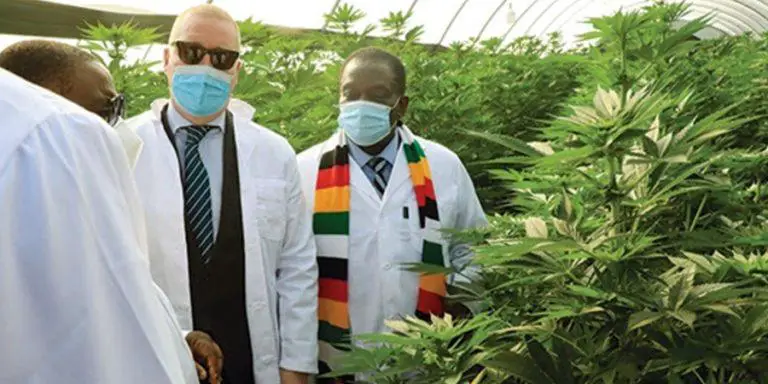- Zimbabwe’s President Emmerson Mnangagwa commissioned a US$27 million Swiss Bioceuticals Limited Medicinal Cannabis Farm and Processing Plant in Mashonaland West Province
- Last year, Zimbabwe alone exported about three tonnes of industrial hemp to Europe although most farmers are in a commercial trial phase
- Only 15 of the 57 cannabis permits issued by the Zimbabwe government since 2018 have been activated
The Government of Zimbabwe did something that seemed like it might never happen: It opened up for farmers to apply for a license to grow and sell medical marijuana.
Mbanje, weed, marijuana, cannabis, or hemp, is one plant that has accounted for many people in Zimbabwe’s prisons.
Possession, let alone, cultivation or smoking it, has had serious consequences such as being fined or ultimately being jailed or both. For years, Zimbabwe has classified it as a dangerous drug and yet, it has many medicinal properties.
According to an article published by Reuters on May 11, 2022, Zimbabwe became one of the first countries in Africa to legalize the production of medicinal cannabis in 2018, hoping for a fresh income stream of badly needed export dollars, and has issued 57 licenses.
Only 15 of the 57 cannabis permits issued by the Zimbabwe government since 2018 have been activated, raising fears some of the permit holders are holding the permits for speculative purposes.
Read: Africa’s cannabis future: reimagining job creation
According to Empower Africa, Lesotho is the first country on the continent to grant an administrative license for the commercial cultivation of marijuana for medical and scientific purposes in 2017. Since then, several countries have followed suit, including Zimbabwe, South Africa, Malawi, Eswatini, Zambia, Uganda, and Rwanda.
Zimbabwe allows for 100% ownership of medicinal cannabis investments, allows for farming on private land, and has put in an added layer of protection called the Investment Stability Agreement.
Recently, Zimbabwe’s President Emmerson Mnangagwa commissioned a US$27 million Swiss Bioceuticals Limited Medicinal Cannabis Farm and Processing Plant in Mount Hampden, Mashonaland West Province.
Farmers Review Africa on May 12, 2022, said Swiss Bioceuticals limited constructed a state-of-the-art medicinal cannabis processing plant, fitted with the first line of medicinal cannabis oil processing. It is also equipped with a cannabis oil processing line aimed at stimulating bio-medical solutions and pharmaceutical products for both local and international markets.
Speaking at the launch, President Mnangagwa implored investors in cannabis farming and processing to quickly operationalize their permits and licenses for the benefit of the country’s economy.
“To date, investments, support, and partnerships from entities linked to the Swiss Confederation (Switzerland), span across sectors such as agriculture, cement manufacturing, agriculture value chain industries, and food processing as well as in spheres such as governance, institutional building and the preservation of the country’s cultural heritage.”
“Leveraging on the Swiss – Zimbabwe Business Chamber launched in 2021, I urge all stakeholders to scale up efforts to see more investment and trade between businesses of the two countries. As Government, we recognize that Switzerland is one of the leading European investors and we are ready to receive more investments from that country,” he added.
According to a Zimbabwean Law firm, the government of Zimbabwe legalized the production of cannabis for medicinal or scientific purposes which the Dangerous Drugs (Production of Cannabis for Medicinal and Scientific Use Regulations) 2018 came into effect in May 2018.
Further, in September 2020 Statutory Instrument 218 of 2020 Agricultural Marketing Authority (Industrial Hemp) Regulations 2020, was gazetted. These regulations were put in place to regulate and provide a conducive environment in the production, procurement, distribution possession, sale, provision, and transportation of cannabis.
According to an article by Zimbabwe Mail on January 17, 2022, international buyers have endorsed Zimbabwe’s industrial hemp in a move expected to expand the country’s export basket and earnings this year.
Africa Cannabis Advisory Group reported that the continent’s Cannabis Market is expected to hit $7.1 Billion United Stated Dollars by 2023, with over 15 tonnes of legal cannabis having been exported to the rest of the world in 2021, a tenfold increase from 2020.
Zimbabwe alone last year exported about three tonnes of industrial hemp to Europe although most farmers are in a commercial trial phase.
“Most farmers are still in the commercial trials phase and one company managed to export three tonnes of the hemp flour to Switzerland and it was a commercial trial again for quality assessment, from what I am hearing quality from Zimbabwe was highly recommended and we are hoping that things continue to improve from there on,” said Zimbabwe Industrial Hemp Trust, Chief Executive officer, and Founder Dr. Zorodzai Maroveke
With a positive industrial hemp global outlook; production is expected to expand this year.
“By the end of this year it will be great if we have over 500 hectares nationwide under hemp production, it will be a good start because we have had disturbances with COVID-19. What we need to understand about the industrial hemp is that the potential is huge, we have existing industries like cotton and tobacco, as you may be aware tobacco is under threat and industrial hemp is so we have to look at alternative crops and I think industrial hemp fits into most of the strategies and the SDGs for both domestic and global vision,” he added.
Cannabis sativa has been cultivated globally for years, and noteworthy is its history for use as a food, fuel source, nutritional supplement, body care product, building material, and medicine. Worldwide there is an increasing demand for hemp-based products and there is also increasing awareness among consumers of the benefits of industrial hemp and its product. This follows that there is room for investing in the production or sale of hemp or cannabis in Zimbabwe.
In conclusion, the formal introduction and legalization of the production of cannabis for medicinal use have opened investment opportunities in this country.
